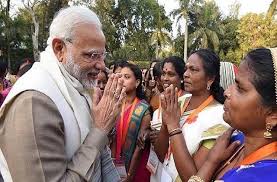New Delhi. The Women’s Reservation Bill was introduced in Parliament for the first time in September 1996. In the last 27 years, this bill reached the House several times, but could not become a ground reality. Last time, it reached the House in 2010 when the bill got approval from the Rajya Sabha but failed to get approval from the Lok Sabha. In September 2023, the Women’s Reservation Bill finally reached the Lok Sabha as the ‘Nari Shakti Vandan Act’. While both BJP and Congress are competing to take credit for the bill, let us see how the UPA (United Progressive Alliance) bill was different from the NDA (National Democratic Alliance).
The 2010 Bill provides for 33% reservation for women in the Lok Sabha, State Assemblies and Delhi Assembly for a period of 15 years from the date of commencement of the Act. There is also reservation for women from Scheduled Caste and Scheduled Tribe communities. There are similar provisions in the new bill also. But the major difference is making delimitation (delimitation ) mandatory before implementing reservation and not mentioning those states and union territories where there is only one Lok Sabha seat.
Nari Shakti Vandan Act: The path to women’s reservation is not easy! Even if passed by Parliament, it will be implemented till 2029
The 2010 bill stated that one-third of the total number of seats reserved for SCs and STs would be given to women and one-third of the total number of seats in the Lok Sabha, State or Union Territory Legislative Assemblies would be reserved for women. Women from SC and ST communities will also be counted in the total 33% reservation.
It also provides that if the seat reserved for SC and ST in respect of a State or Union Territory is one, then in each block having three general elections to the Lok Sabha, the seat for women belonging to SC or ST in the first general election shall be Will be reserved. And no seats will be reserved in the other two general elections. The old bill also talked about states/UTs where two seats are reserved for SC/ST, allowing reservation for women on a rotation basis. This was for both the Assemblies and the Lok Sabha. A similar practice is also taking place in local bodies where there is 33% reservation for women.
The new bill allows rotation of seats reserved for women in the Lok Sabha, state assemblies and the Delhi Assembly after each delimitation process determined by Parliament. However, it did not mention those states where less seats are reserved. It has been proposed in the new bill that the 33% Reservation Act can be implemented only after the first delimitation after the first census. If there is no delay, the next scheduled delimitation exercise is to take place after 2026.
Parties have a habit of choosing ‘weak’ women, ruckus over Kharge’s statement, Nirmala Sitharaman hit back
This will be based on the first census conducted after 2026. If everything goes as per schedule, the next census will have to be conducted in 2031. Only after which delimitation will happen. However, due to the Covid outbreak, Census 2021 has not been conducted yet. Therefore, if there is a census after 2026, then delimitation can be done accordingly.
Moreover, the bill is also different from what was anticipated. There is no provision for reservation for women in the Rajya Sabha or the State Legislative Council in the new bill. OBC women are also not included in this, although many parties were demanding this. For the bill to become law, it is necessary to get approval from both houses of the Parliament.
 Indian Thought Latest News & Views
Indian Thought Latest News & Views



